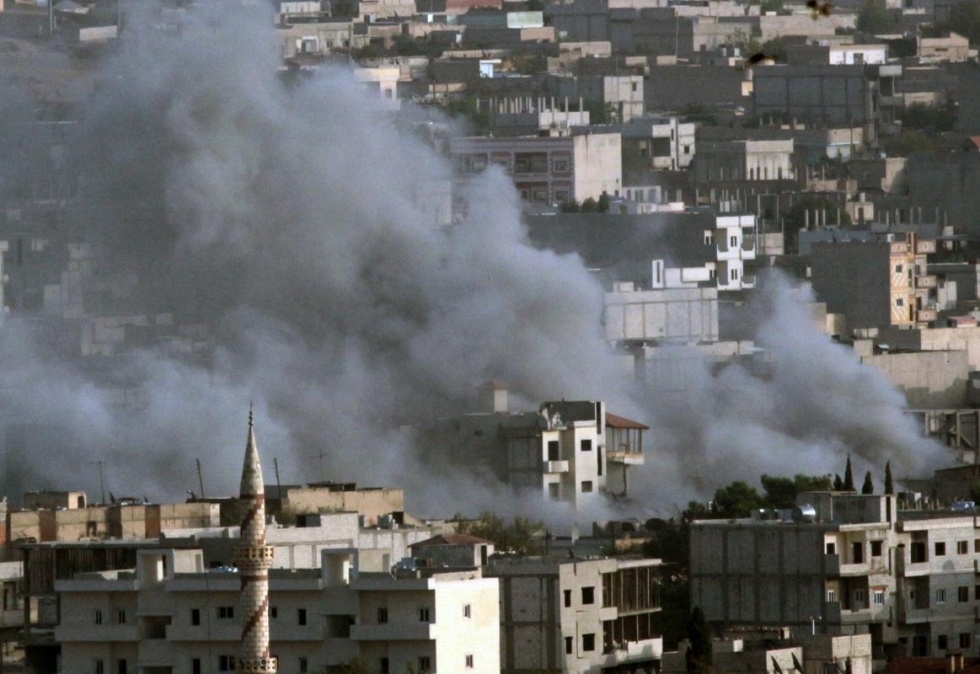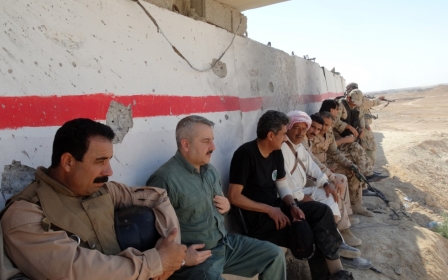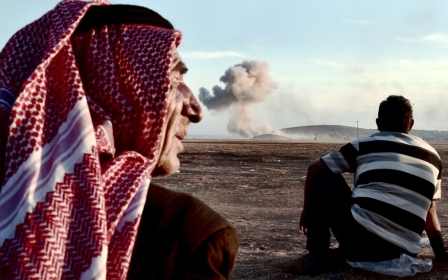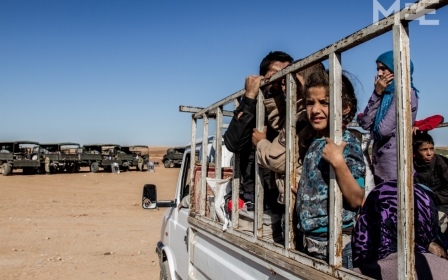US-led coalition seeks new plans to counter Islamic State

Commanders from the US-led coalition against Islamic State militants will meet in Washington Tuesday to discuss halting the group's advance in Iraq and Syria, as air strikes failed to stop militants from reaching the centre of Kobane.
IS fighters claimed nearly half of the flashpoint town, on the border with Turkey, on Monday, despite more than three weeks of US-led airstrikes aimed at halting them.
That failure will be among the main points up for discussion at Tuesday's meeting in Washington of military chiefs from the 22 countries in the US-led coalition, as will Turkey's call for the establishment of a protective buffer zone.
Top brass, including national chiefs of staff, will also meet US President Barack Obama at Andrews Air Force Base outside the US capital, the White House said.
The generals will "discuss a common vision on the anti-IS campaign, challenges and the way ahead," said US Colonel Ed Thomas, spokesman for the chairman of Joint Chiefs of Staff.
Australia, Bahrain, Belgium, Britain, Canada, Denmark, Egypt, France, Germany, Iraq, Italy, Jordan, Kuwait, Lebanon, the Netherlands, New Zealand, Qatar, Saudi Arabia, Spain, Turkey, the United Arab Emirates and the United States will be represented.
It is the first time such high-ranking military officials from so many countries have come together since the coalition – which theoretically includes 60 countries - was formed in September.
One of the ideas on the table is the creation of a buffer zone along the Turkey-Syria border. Coalition members are divided on the topic and Washington has already said, the topic will probably not dominate the agenda.
But US officials were tight-lipped about precisely what is expected to emerge, and said major strategy announcements were not likely.
Turkey denies airbase deal
In their latest air strikes, American and Saudi warplanes targeted seven sites around Kobane, the US military said, including IS staging posts used to try to cut the town off from the outside world.
A Kobane politician who is now a refugee said IS fighters had surrounded the town to the south, east and west, and warned of a "massacre" if they take the northern front bordering Turkey.
Fighting spread to less than a kilometre (half a mile) from the barbed wire frontier fence, with the militants carrying out three suicide car bomb attacks in the border zone, said the Syrian Observatory for Human Rights.
The Britain-based monitoring group later said IS had advanced into central Kobane, seizing a major building and squeezing the town's Kurdish defenders into its northern half bordering Turkey.
With the militants advancing on its doorstep, NATO member Turkey has come under intense pressure to take action as part of the coalition that has been carrying out air strikes in both Syria and Iraq.
Ankara, which has called for a buffer zone to guard its border and provide some protection to fleeing Kurds, denied allowing the United States to use its bases against IS.
"We are holding intense negotiations with our allies. But there are not any new developments about Incirlik," a base in southern Turkey, Deputy Prime Minister Bulent Arinc said.
Iraqis quit Anbar base
Concern has also been growing over Iraq, where IS fighters have been threatening to seize more territory.
Iraqi forces are reported to be under intensifying pressure in Anbar province between Baghdad and the Syrian border, where a roadside bomb killed the police chief on Sunday.
On Monday, security sources said Iraqi government troops stationed on the edge of the city of Heet in Anbar had withdrawn to another base, leaving the city under full militant control.
Pro-government forces have also been in trouble south of IS-held Mosul around Baiji oil refinery, where US aircraft on Sunday for the first time dropped supplies including food, water and ammunition to Iraqi troops.
Washington has insisted it will not send ground troops back to Iraq, and Secretary of State John Kerry said in Cairo that the Iraqis themselves will have to succeed on the ground.
In violence in the Iraqi capital on Monday, three bombings within an hour rocked Shiite neighbourhoods, leaving at least 22 dead.
Fighters divide up 'slaves’
IS is accused of committing widespread atrocities in areas under its control, including attacks on civilians, mass executions, beheadings and enslaving women.
In the latest issue of its propaganda magazine Dabiq, IS militants boasted of having revived slavery, giving Yazidi women and children captured in northern Iraq to the group's fighters as spoils of war.
The group, which has cut swathes of territory through Iraq and Syria since January, has also murdered four Western hostages seized in Syria in on-camera beheadings.
More than 180,000 people have been killed in Syria since an uprising against President Bashar al-Assad's regime began in 2011, evolving into a several-sided civil war that has drawn thousands of jihadists from overseas.
Meanwhile, rights watchdog Amnesty International accused Shiite militias backed by the Iraqi army of committing war crimes against civilians in their fightback against IS.
New MEE newsletter: Jerusalem Dispatch
Sign up to get the latest insights and analysis on Israel-Palestine, alongside Turkey Unpacked and other MEE newsletters
Middle East Eye delivers independent and unrivalled coverage and analysis of the Middle East, North Africa and beyond. To learn more about republishing this content and the associated fees, please fill out this form. More about MEE can be found here.




